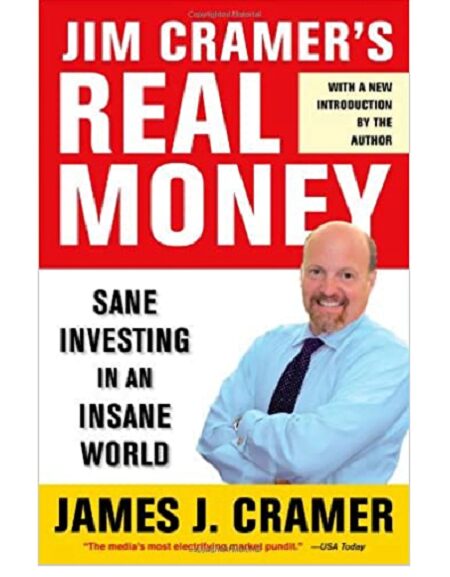
Jim Cramer – Real Money | 340 MB
For starters, Cramer recommends devoting a portion of your assets to speculation.
Everyone wants to find the big winners that can bring outsized gains, and Cramer explains how to allocate your portfolio so that you can afford to take this kind of risk wisely.
He explains why “buy and hold” is a losing philosophy: For Cramer, it’s “buy and homework.” If you can’t spend an hour a week researching each of your stocks, then you should hand off your portfolio to a mutual fund – and Cramer identifies the very few mutual funds that he’d recommend.
Cramer reveals his Ten Commandments of Trading (Commandment #5: Tips are for waiters). He explains why he’s not afraid to compare investing to gambling (and tells you which book on gambling you should read to become a better investor). He discloses his Twenty-Five Rules of Investing (Rule #4: Look for broken stocks, not broken companies).
Cramer shows how to compare stock prices in a way that you can understand, how to spot market tops and bottoms, how to know when to sell, how to rotate among cyclical stocks to catch the big moves, and much more. “Jim Cramer’s Real Money” is filled with insider advice that really works, information that Cramer himself used to make millions during his fourteen-year career on Wall Street.
Written in Cramer’s distinctive turbocharged style, this is every investor’s guide to what you really must know to make big money in the stock market.
Editorial Reviews
From Publishers Weekly
After telling the story of his own trading days in Confessions of a Street Addict, Cramer appeases fans hoping for advice on how to duplicate his success with their own investment portfolios. But not without some strong caveats: his approach requires devoting at least an hour a week to educating yourself about each stock you own. But since most pros are “rank amateurs themselves,” anyone willing to do the work should consider getting in. Cramer breaks down the fundamentals of his investment approach, built on the twin principles of diversification and speculation: while most of your portfolio should contain reliables like oil, financials and blue-chip companies, 20% percent of your money should go toward a slightly riskier bet on a company’s future (“owning a stock is a bet on the future, not the past”). He also explains techniques for figuring out when to buy rock bottom stocks and sell the ones that have hit their peaks. Cramer drills his main points over and over, which can get repetitive on the anecdotal level but reinforces the simplicity of his message: investing is for anybody willing to put the time into learning how to do it right. His enthusiasm should prove inspiring, and even investors on the wrong side of Wall Street’s recent shakeups may find the courage to get back in the game. Either way, Cramer’s radio, TV and print platforms are sure to make this one another hit. Agent, Suzanne Gluck at William Morris. (Apr. 5)
Copyright Reed Business Information, a division of Reed Elsevier Inc. All rights reserved.
From Booklist
Cramer, cofounder of TheStreet.com, the daily financial news Web site, and cohost of CNBC’s Kudlow & Cramer, is a successful trader and former hedge-fund manager. His autobiography, Confessions of a Street Addict (2002), was an honest portrayal of his sometimes-brutal rise to the top; it was not a trading manual. Here Cramer reveals how he made his money and distills his methods so that the average reader can understand them. Rather than catering to the Wall Street party line of “buy and hold” investing, he is an advocate of “buy and homework.” He recommends starting with just four stocks in safe, diverse sectors and devoting a minimum of one hour per week of study to each company. Although others condemn speculation as pure gambling, Cramer insists that the fifth part of your portfolio should be devoted to a purely speculative play to take advantage of potential “home runs”; although much of his advice is for serious students of the market, there is a special trial offer for ActionAlertsPLUS.com, a Web site where Cramer openly reveals all of his trades before he makes them, giving his subscribers the opportunity to get in before he does. David Siegfried
Copyright American Library Association. All rights reserved




